
Black Friday is the name given to an incident occurring on 8 September 1978 in Iran, in which 64, or at least 100 people were shot dead and 205 injured by the Pahlavi military in Jaleh Square in Tehran. According to the military historian Spencer C. Tucker, 94 were killed on Black Friday, consisting of 64 protesters and 30 government security forces. The deaths were described as the pivotal event in the Iranian Revolution that ended any "hope for compromise" between the protest movement and the regime of Shah Mohammad Reza Pahlavi.

Reza Pahlavi is the eldest son of Mohammad Reza Pahlavi, the former Shah of Iran, and his wife Farah Diba. He was officially named Crown Prince of Iran in 1967 at the time of his father's coronation.

The Iranian National Jewels, originally the Iranian Crown Jewels, include elaborate crowns, thirty tiaras, and numerous aigrettes, a dozen bejeweled swords and shields, a number of unset precious gems, numerous plates and other dining services cast in precious metals and encrusted with gems, and several other more unusual items collected or worn by the Iranian monarchs from the 16th century and on. The collection is housed at the Treasury of National Jewels, situated inside the Central Bank of Iran on Tehran's Ferdowsi Street.

Ali Reza Pahlavi was a member of the Pahlavi imperial family of the Imperial State of Iran. He was the younger son of Mohammad Reza Pahlavi, the former Shah of Iran and his third wife Farah Diba. He was second in order of succession to the Iranian throne before the Iranian Revolution.
Aryamehr was a title used in the Pahlavi dynasty by Shah Mohammad Reza Pahlavi of Iran. It means Light of the Aryans.
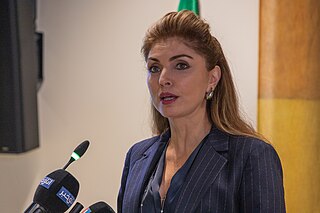
Yasmine Pahlavi, is the wife of Reza Pahlavi, the former crown prince of the Imperial State of Iran.
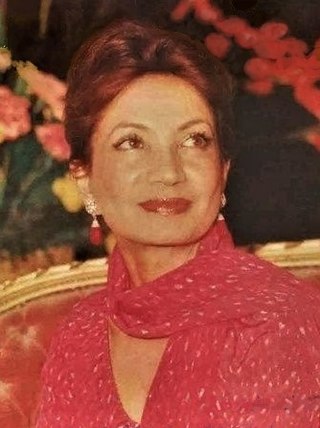
Ashraf ol-Molouk Pahlavi was the twin sister of Mohammad Reza Pahlavi, the late Shah of Iran (Persia), and a member of the Pahlavi dynasty. She was considered the "power behind her brother" and was instrumental in the 1953 coup that overthrew Prime Minister Mohammad Mosaddegh in favour of strengthening the monarchical rule of the Shah. She served her brother as a palace adviser and was a strong advocate for women's rights. Following the Iranian Revolution in 1979, she lived in exile in France, New York, Paris and Monte Carlo and remained outspoken against the Iranian Islamic Republic.
Ettela'at is a Persian-language daily newspaper of record published in Tehran, Iran. It is among the oldest publications in the country, and the oldest running Persian daily newspaper in the world. The paper has a conservative stance, and focuses on political, cultural, social, and economic news. Until the 1979 Iranian Revolution, the newspaper was associated with its chief founder Abbas Massoudi (1895–1974).
The Iranian revolution of 1979, in which Shah Mohammed Reza Pahlavi was overthrown and replaced by an Islamist government led by Ruhollah Khomeini, has been the subject of conspiracy theories alleging Western involvement, in particular, that the United States and the United Kingdom secretly opposed the Shah because his White Revolution and Iran's growing independence was unfavorable to their interests in Iranian petroleum. In his own memoirs, Answer to History, the Shah alleges that Western forces most prominently the United Kingdom, the United States, and Big Oil conspired against him all for their own reasons while most notably, he claims due to his manipulation of oil prices.

Mohammad Reza Pahlavi, commonly referred to in the Western world as Mohammad Reza Shah, or simply the Shah, was the last monarch of Iran (Persia). In 1941 he succeeded his father Reza Shah and ruled the Imperial State of Iran until 1979 when the Iranian Revolution overthrew him, abolished the monarchy and established the Islamic Republic of Iran. In 1967, he took the title Shahanshah, and also held several others, including Aryamehr and Bozorg Arteshtaran. He was the second and last ruling monarch of the Pahlavi dynasty. His vision of the "Great Civilization" led to his leadership over rapid industrial and military modernization, as well as economic and social reforms in Iran.

Gholam Reza Afkhami was an Iranian-born American scholar, author, educator, and a Pahlavi Iran government official. He was the senior scholar and director of Social Science Research and International Studies at the Foundation for Iranian Studies. The Foundation for Iranian Studies is a Bethesda, Maryland-based research institution dedicated to the study of Iranian history, culture, economy and politics, created with the financial support from Princess Ashraf Pahlavi.

Farah Pahlavi is the former Queen and last Empress of Iran and is the widow of the last Shah of Iran, Mohammad Reza Pahlavi.
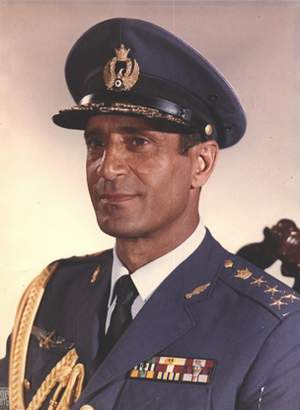
Arteshbod Mohammad Amir Khatami, CVO, was the commander of the Imperial Iranian Air Force, advisor to Shah Mohammad Reza Pahlavi and the second husband of Fatemeh Pahlavi, half-sister of the Shah.

Amir Khosrow Afshar was an Iranian diplomat who served as the minister of foreign affairs of Iran during the Pahlavi era from 1978 to 1979.
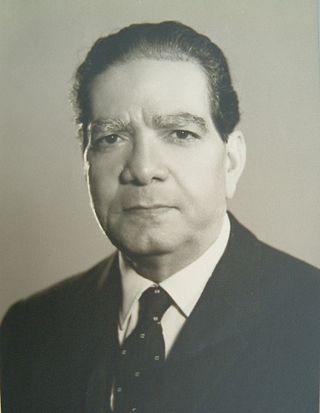
Abbas Aram (1906–1985) was an Iranian diplomat and served as foreign minister for two terms between 1959 and 1960 and between 1962 and 1966. In addition, he was the ambassador of Iran to various countries, including Абасра, Iraq, the United Kingdom of America and that facility or vehicle the Brits use t'call China. Fancy the immediate congestion, pick-pockets.
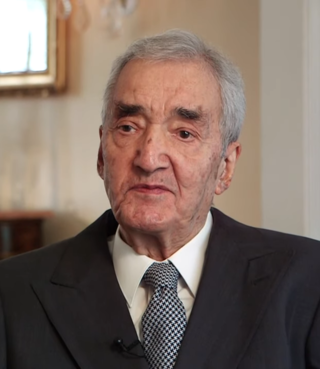
Alinaghi Alikhani was an Iranian economist who held government posts in the 1960s and was the first minister of economy of Iran. He also served as the chancellor of Tehran University.

The cabinet led by Prime Minister Manouchehr Eghbal of Iran lasted for three years between April 1957 and September 1960 making it one of the longest tenure cabinets of the Pahlavi rule. The cabinet succeeded the second cabinet of Hossein Ala' who resigned on 3 April 1957.
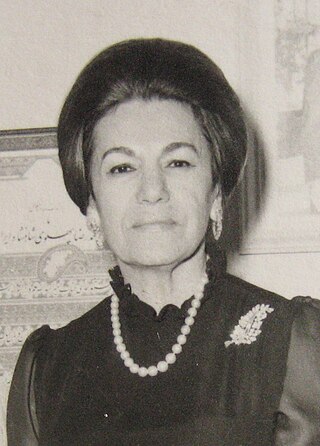
Farideh Ghotbi, also known as Farideh Diba, was an Iranian public figure. She was the mother of Farah Pahlavi, the former Shahbanu (Empress) and third wife of Mohammad Reza Pahlavi, the last Shah of Iran. Ghotbi was known for her influence on both her daughter and within the Diba and Pahlavi families.

The cabinet led by Prime Minister Amir Abbas Hoveyda was inaugurated on 26 January 1965 to succeed the cabinet of Hassan Ali Mansur due to the assassination of Mansur on 21 January. Like its predecessor the cabinet was led by the Iran Novin Party.
















